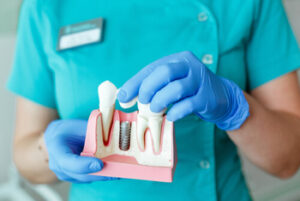In dental health, particularly when considering dental implants, the cost is a key factor for many patients. This consideration has led to a growing trend in dental tourism, with Bali emerging as a favoured destination for its seemingly cost-effective dental treatments. However, when comparing the dental implant cost in Bali to that in Australia, it becomes essential to look beyond the price tag and examine the overall value of the procedure, including the quality of care and long-term outcomes.
Dental implants have revolutionised the approach to missing teeth, offering a permanent solution mimicking natural teeth in appearance and function. The process, involving implant surgery and the placement of artificial teeth, is not just a surgical or invasive procedure; it’s a significant step in enhancing oral health and self-esteem. In Bali, dentists often attract patients with the promise of low-cost dental implant procedures. The lure of undergoing dental implants in Bali, with its comfortable waiting rooms and seemingly first-class dental treatment at a fraction of the cost, is undeniable.
However, Australian dental clinics present a compelling case for considering the higher dental implant costs. The standards of dental treatments in Australia are renowned for their adherence to stringent health and safety protocols, employing experienced dentists and the latest technology. These factors contribute to a high success rate and ensure the longevity of the implants, a crucial aspect often overlooked in the pursuit of cost savings.
Additionally, health insurance may partially cover dental implant procedures in Australia, offering an offset against the higher upfront costs. The hidden costs and risks involved in dental treatments abroad, particularly for a procedure as intricate as teeth implants, must be factored into the decision-making process.
While Bali offers an attractive proposition for cost-effective dental work, the comprehensive benefits and assurances provided by Australian dental clinics, from the quality of dental practitioners to the use of advanced technology in implant surgery, suggest a deeper value for those seeking dental implants. This blog explores these aspects, guiding patients in making an informed decision about their dental implant journey.
Understanding Dental Implants: Types and Procedures
Dental implants have become a cornerstone of modern dental treatments, offering a permanent solution for missing teeth and significantly enhancing oral health. Understanding the types and procedures of dental implants is crucial, especially for those contemplating undergoing dental implants, whether in their home country or through dental tourism destinations like Bali.
Types of Dental Implants
There are two types of dental implants: endosteal and subperiosteal. Endosteal implants are the most commonly used and involve placing a screw-like post directly into the jawbone, serving as a sturdy foundation for artificial teeth. Subperiosteal implants, less common, are placed under the gum but above the jawbone, often used for patients who do not have a healthy jawbone and cannot or do not want to undergo bone grafting.
The Dental Implant Procedure
The dental implant procedure is a multi-step surgical process and can vary depending on the implant type and the patient’s jawbone condition. Initially, it involves a detailed assessment by experienced dentists, who create a tailored treatment plan. The surgery starts with placing the implant into the jawbone, followed by a healing period where the implant integrates with the bone – a process known as osseointegration. After this, an abutment is attached to the implant, upon which the artificial teeth or crown will be mounted.
Cost Considerations
The dental implant cost varies widely, influenced by factors like the type of implant, the complexity of the procedure, and geographical location. Dental implant costs in Bali are often lower compared to countries like Australia, making it a popular choice for dental tourism. However, patients should consider the quality of dental work, the expertise of dental practitioners, and the standards of dental clinics. While cost savings are appealing, the risks involved in any surgical or invasive procedure, especially when performed abroad, should be considered.
Quality and Long-term Outcomes
It’s essential to consider the long-term outcomes and quality of dental treatments. High-quality implants, when properly maintained, can last a lifetime, making them a cost-effective solution despite the initial expense. Dental clinics in Australia, for instance, are known for their use of the latest technology and adherence to strict safety standards, which can influence the success rate of the implant procedure.
In conclusion, while the allure of cost savings in Bali is undeniable, patients should thoroughly research and consider all aspects, including the risks, quality of dental clinics, and the potential need for follow-up treatments. Dental implants are a significant investment in one’s dental health and should be approached carefully considering all these factors.
The Disadvantages of Opting for Dental Implants in Bali
While the prospect of getting dental implants in Bali may seem appealing with its notably lower dental implant costs, several disadvantages must be considered. These factors play a crucial role in determining the overall effectiveness and safety of the dental implant procedure.
Quality and Standards of Dental Clinics
One of the primary concerns is the varying standards of dental clinics in Bali. Despite some high-quality clinics, facilities are more consistent with dental. This variability can significantly impact the outcome of dental treatments, especially for a complex procedure like dental implants.
Experience and Expertise of Dentists
The expertise of Bali dentists in performing dental implant procedures can also be a point of concern. While there are undoubtedly skilled dental practitioners in Bali, the level of experience and training might not be equivalent to what patients typically find in Australia. This disparity can affect the success rate of the implants and the long-term health of the patient’s oral cavity.
Communication and Follow-up Challenges
Undergoing dental treatments abroad can lead to communication barriers, which are crucial during detailed procedures like dental implants. Additionally, vital for dental implant procedures, follow-up care can be challenging when the patient returns to their home country. Any complications or adjustments would require additional travel or seeking a local dentist who may not be familiar with the patient’s treatment history.
Hidden Costs and Health Insurance Coverage
While the initial dental implant costs in Bali might be lower, there can be hidden costs related to travel, accommodation, and potential follow-up visits. These expenses can accumulate, reducing the cost-effectiveness of choosing Bali for dental implants. Furthermore, treatments in Bali may not be covered by health insurance plans, which can often offset some of the costs for dental procedures performed within the patient’s home country.
Risks and Safety Concerns
Every surgical or invasive procedure carries risks, which may be amplified when undergoing treatment abroad. The hygiene and safety protocols standards in some Bali dental clinics may differ from those in Australia, potentially increasing the risk of complications like infections.
In conclusion, while the lower dental implant cost in Bali is enticing, weighing these savings against the potential risks and challenges is important. Quality of care, experience of dental practitioners, and the safety of the procedure are paramount considerations that should not be compromised for cost savings. Patients are advised to thoroughly research and consider all these factors before undergoing dental implants in Bali.
Advantages of Getting Dental Implants in Australia
Opting for dental implants in Australia presents several advantages, particularly in quality, safety, and long-term dental health. While the dental implant cost might be higher than in Bali, the benefits of this surgical procedure in Australia are significant.
High Standards of Dental Clinics and Treatments
Australian dental clinics are renowned for their high standards in dental treatments. They are equipped with the latest technology and adhere to strict health and safety regulations, ensuring dental implant procedures are performed with the utmost precision and care. This commitment to quality significantly reduces the risks involved in the procedure and increases the success rate of dental implants.
Experienced and Accredited Dental Practitioners
In Australia, dental practitioners performing implant surgery are highly qualified and experienced. These dentists undergo rigorous training and are well-versed in the latest advancements in dental care, which is crucial for complex procedures like dental implants. Their expertise ensures that patients receive first-class dental treatment, from the initial consultation to the final placement of artificial teeth.
Comprehensive Follow-up Care and Health Insurance Coverage
Undergoing dental implants in Australia often include comprehensive follow-up care, vital for the procedure’s success. The same dental team that performed the surgery can promptly address any complications or adjustments. Additionally, many Australian health insurance plans provide coverage for dental procedures, which can help mitigate overall dental implant costs.
Lower Risk of Complications and Enhanced Safety
The higher standards of cleanliness and safety protocols in Australian dental clinics minimise the risk of complications such as infections or implant failure. The dental implant procedure, being an invasive one, carries inherent risks, but these are significantly reduced in a well-regulated healthcare environment.
Long-term Cost Effectiveness and Quality Assurance
While the initial dental implant cost in Australia might be higher compared to Bali, the long-term benefits and cost-effectiveness of receiving high-quality care must be balanced. When properly placed and cared for, quality dental implants can last a lifetime, reducing the need for future replacements or repairs.
Conclusion
In conclusion, while Bali, Indonesia, offers attractive options for dental implants, it’s crucial to consider the long-term benefits and quality of choosing Australian dental services, such as those provided by DDSS. The cost of dental implants in Australia might be higher than in Bali, but this often reflects the superior quality, stringent health regulations, and aftercare support. Australian dental clinics like DDSS adhere to rigorous health and safety standards, ensuring patients receive the highest level of care.
Furthermore, the proximity of services in Australia reduces additional costs and inconveniences associated with travel. With local access to aftercare and follow-up treatments, patients benefit from peace of mind and continuous support. The expertise and technology available at DDSS are of the highest calibre, ensuring that your dental implant procedures are successful, comfortable, and tailored to your needs.
For those prioritising quality, safety, and long-term dental health, investing in Australian dental care is a wise choice. We invite you to explore the exceptional services at DDSS. Your journey towards a healthier, more confident smile starts with us.
Call us to start your journey towards your best smile!
Sydney CBD: (02) 8294 5812
Gosford: (02) 8294 8656
Eastwood: (02) 9299 8842
Tugerrah: (02) 8207 3164
Note: Any surgical or invasive procedure carries risks. Before proceeding, you should seek a second opinion from an appropriately qualified health practitioner.
References:
https://pubmed.ncbi.nlm.nih.gov/8699485/
https://www.dentalhealth.org/Blog/dental-implants-and-how-crucial-replacing-teeth-really-is
www.verywellhealth.com/what-to-expect-during-a-dental-implant-procedure-1059372
https://www.webmd.com/oral-health/dental-implants
https://www.healthline.com/health/dental-and-oral-health/are-dental-implants-safe









